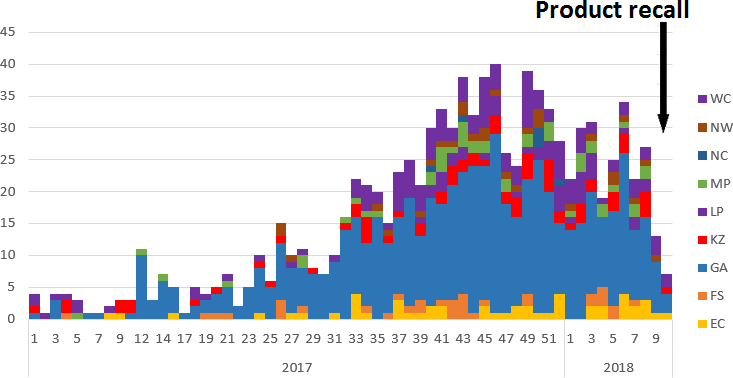The Food and Drugs Authority has announced that it has intensified post-market surveillance to make sure that meat products that have been affected by the listeria bacteria are recalled.
“We have a full alert at the port of entry to make sure that those products will not come in. We’ve intensified post-market surveillance throughout the Easter period, we will be going around to check if any has been brought in at all. We will make sure that we collect them all, in what we call a full recall. We will go round all the supermarkets to make sure that there is none,” Chief Executive Officer of the Authority, Delese Mimi Darko, told Citi News.
In the last few weeks since Rwanda’s caution on food imports from South Africa, the FDA has warned Ghanaians against purchasing possibly listeriosis infected processed meat products by Enterprise Foods.
The Authority also announced that it would destroy the meat products from Enterprise Foods in Polokwane, South Africa.
The outbreak of listeriosis has been going on since the start of 2017. According to the World Health Organisation, 978 laboratory-confirmed listeriosis cases have been reported in South Africa between January 1, 2017, and March 14, 2018. 42% of the cases have been neonates who were infected during pregnancy or delivery.

Number of Laboratory-Confirmed Cases of Listeriosis by Week of Sample Collection and Province, South Africa, 01 January 2017 to 12 March 2018 (n=978)
Source: National Institute for Communicable Diseases (NICD), South Africa2.
In January, Rwanda warned Ghana to ban the importation of some food products from South Africa to avert the outbreak of listeriosis. Before the warning, Rwanda had already placed a ban on some food products from South Africa.
After the warning, the Ghana’s Ministry of Health assured Ghanaians that it had beefed up surveillance in the country to forestall the outbreak and spread of the disease.
About Listeriosis
Listeriosis is food poisoning that is caused by eating foods contaminated with the Listeria monocytogenes bacterium. In pregnant women, the infection can result in miscarriage, premature delivery, serious infection of the newborn or even stillbirth.
It mainly affects pregnant women, newborns, the elderly, and adults with impaired immune systems.
According to the WHO, the outbreak in South Africa is the largest that has been detected worldwide. Due to the potentially long incubation period (one to three weeks and up to 70 days), further cases are expected before the impact of the recall of the affected food products is observed.


Comments are closed.